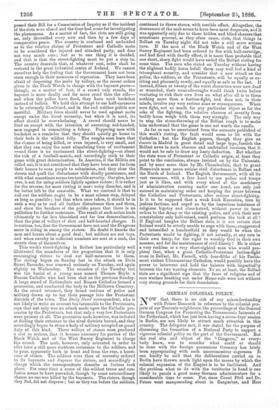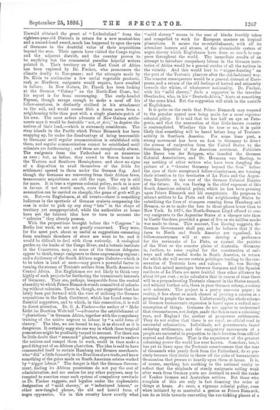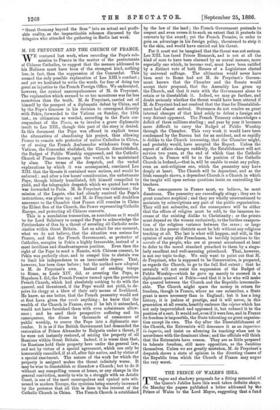GERMAN COLONIAL POLICY.
NOW that there is no risk of any misunderstanding with Prince Bismarck in reference to the colonial pro- jects of our Teutonic neighbours, the proceedings of the General German Congress for Promoting the Transoceanic Interests of the Fatherland, which has just been having a seven-days' session in Berlin, are not likely to attract much attention in this country. The delegates met, it was stated, for the purpose of discussing the formation of a National Party to support a vigorous colonial policy on the part of the Government. But the real aim and object of the "Congress," as every- body knew, was to consider what could or should be done with the foreign possessions Germany has lately been appropriating with such unceremonious eagerness. It can hardly be said that the deliberations carried on in Berlin have thrown much light upon the means by which the colonial expansion of the Empire is to be facilitated. And the problem what to do with the territories in hand is one likely to puzzle a good many German administrators for a considerable time to come. For, since Count Pfeil and Dr. Peters went masquerading about in Zangaebar, and Herr
Einwald obtained the grant of " Ltideritzland " from the eighteen-year-old Dinizulti in return for a new musical-box and a second-hand sword, much has happened to open the eyes of Germans to the doubtful value of their acquisitions beyond the seas. Their agents have visited the Congo region and the adjacent district, and the country proves to be anything but the commercial paradise hopeful writers painted it. Their territory on the East Coast of Africa has been explored by Dr. Fischer, who pronounces the climate deadly to Europeans ; and the attempts made by Dr. Klein to acclimatise a few useful vegetable products, such as Northern emigrants would require, have resulted in failure. In New Guinea, Dr. Finsch has been looking at the German " Colony " on the North-East Coast, but
his report is far from encouraging. The curly-headed Papuan, though savage enough to make a meal off his fellow-creatures, is distinctly civilised in his attachment to the soil, and would sooner filch a dozen acres from a neighbouring tribe than part with a single plantain-patch of his own. The most ardent advocate of New Guinea settle- ments says it would be desirable " not, at first," to deprive the natives of their land,—which is extremely considerate. The stray islands in the Pacific which Prince Bismarck has been snapping up, lie under the disadvantage of being inaccessible to Germans until regular communication is established with them, and regular communication cannot be established until colonists are forthcoming ; and these are conspicuously absent. The emigrants from the Fatherland are as numerous as ever ; but, as before, they crowd to Saxon homes in the Western and Southern Hemispheres, and show no signs of a disposition to avail themselves of the fields for settlement opened to them under the German flag. And though the Germans are recovering from their African fever, transoceanic acquisitions are still the rage. The cry is still for more. It is true a vigorous colonial policy, such as is now in favour, if not worth much, costs but little ; and while annexation can be carried on cheaply, the game of grab will go on. But—to Englishmen, at all events—there is something ludicrous in the spectacle of German cruisers compassing the seas in order to pick up any stray "lots" in the shape of territory yet unappropriated, while the authorities at home have not the faintest idea how to turn to account the " colonies " they already possess.
With the propositions brought before the " Congress" in Berlin last week, we are not greatly concerned. They were, for the most part, about as useful as suggestions emanating from academic threshers of straw are wont to be, and it would be difficult to deal with them seriously. A zoological garden on the banks of the Congo River, and a botanic institute in the Caraeroons, may, as some of the German delegates appear to think, tempt emigrants to these unpromising regions ; and a dictionary of the South African negro dialects—which is to be taken :n hand at once—may prove a powerful factor in turning the stream of Teutonic settlers from North America to Central Africa. But Englishmen are not likely to think very highly of such projects for furthering the transoceanic interests of Germany. They are, perhaps, inseparable from the central absurdity to which Prince Bismarck stands committed of colonis- ing without colonists. There is, though, one suggestion that has lately been put forward with the view of utilising the German acquisitions in the Dark Continent, which has found some in- fluential supporters, and to which, in this connection, it is well to direct attention. Dr. G. A. Fischer—the author of " Mehr Licht im Dunklen Welt-teil "—advocates the establishment of "plantations in German Africa, together with the compulsory training of the native negroes to labour by "a mild form of slavery." The idea, we are bound to say, is as shrewd as it is dangerous. It certainly suggests one way in which these tropical possessions might be profitably turned to account. For there can be little doubt that "seasoned" planters, empowered to enslave the natives and compel them to work, could in time make a good thing out of an African plantation. The idea is said to have commended itself to certain Hamburg and Bremen merchants. who "did" a little formerly in the Brazilian slave trade, and know something of the gains made on South American estates worked by "nigger labour." The danger is that the German Govern- ment, finding its African possessions do not pay the cost of administration, and are useless for any other purposes, may be tempted to sanction some such system of compulsory servitude as Dr. Fischer suggests, and legalise under the euphemistic designation of "mild slavery," or "indentured labour," or other new-f angled phrase, the old and horrid form. of negro oppression. We in this country know exactly what "mild slavery" means in the case of blacks forcibly taken and compelled to work for European masters on tropical plantations. It means the re-establishment, with all its attendant horrors and abuses, of the abominable system of negro slavery which Englishmen have done so much to sup- press throughout the world. The immediate results of an attempt to introduce compulsory labour in the German terri- tories of Africa would be a general exodus of all the natives in the vicinity. And this would lead to " nigger-hunting " on the part of the Teutonic planters after the old-fashioned way. The remoter consequences would be a general distrust of Euro- peans, and a return of the old feelings of hatred and animosity towards the whites, of whatsoever nationality. Dr. Fischer, with his "mild slavery," finds a supporter in the traveller Oberltinder, who, in his "Deutsch-Africa," hints at something of the same kind. But the suggestion will stink in the nostrils of Englishmen.
It is quite on the cards that Prince Bismarck may respond to the popular appeal now being made for a more vigorous colonial policy. It is said that he has half an eye on Pata- gonia, and that the annexation of that little-known country is contemplated. Whether this be true or no, it is quite likely that something will be heard before long of Teutonic activity in Southern America. For some time past, a strong movement has been on foot in Germany to divert the stream of emigration from the United States to the Southern Republica of the American continent. Publicists like Baron von der Briiggen, who founded the German Colonial Associations, and Dr. Hermann von Ihering, to say nothing of other writers who have been dangling the picture of a "Greater Germany beyond the Seas" before the eyes of their enraptured fellow-countrymen, are turning their attention to the territories of La Piata and the Argen- tine Republic as the seat of the German Colonial Empire of the future. Dr. von Ihering is the chief exponent of this South American colonial policy, which he has been pressing upon Prince Bismarck and his compatriots. He proposes to attract settlers to La Plata and the neighbouring States by subsidising the lines of steamers running from Hamburg and Bremen, so as to make the fare to these places lower than to New York. In 187(i, the North-German Lloyd offered to con- vey emigrants to the Argentine States at a cheaper rate than to Castle Gardens, provided a grant of five or six million marks was made to them. This amount, Von Ihering suggests, the German Government shall pay, and he believes that if the fares to North and South America are equalised, his fellow-countrymen will at once develop a preference for the savannahs of La Plata, as against the prairies of the West or the remoter plains of Australia. Germany is, further, to raise capital for the construction of rail- ways and other useful works in South America, in return for which she will secure certain privileges tending to the con- servation of Teutonic laws and culture. Dr. von Ihering finds that mixed marriages between Germans and the Spanish residents of La Plata are more fruitful than other alliances by about 30 per cent. ; so he calculates that in course of time there will be a preponderating Teutonic element in the States named, and without further ado, there is your German colony, a colony with colonists. The project is a pretty one—on paper ; in reality, it has about as much chance of proving a success as a proposal to people the moon. Unfortunately, the whole scheme of German transoceanic expansion is based upon a radical mis- conception of things. Germans do not appear to understand that circumstances' not design, made the Saxon race a colonising race, and Englani the, mother of prosperous settlements. They do not realise that there is no royal, no official road to successful colonisation. Individuals, not governments, found enduring settlements, and the emigratory movements of a people are successful in proportion to their freedom from official control and direction. That is the experience of the greatest colonising power the world has ever known. Somehow, too, it has yet to dawn upon the Teutonic consciousness that the tens of thousands who yearly flock from the Fatherland, do so pre- cisely because they desire to throw off the yoke of bureaucratic Germanism that presses ea heavily upon them at home. It is, of course, anything but soothing to the national vanity .to reflect that the shiploads of sturdy emigrants sailing week after week from German ports are destined to swell the ranks of Yankee farmers and Australian settlers. But those who complain of this are only in fact damning the order of things at home. Au rests, a vigorous colonial policy, even when initiated by so masterful a genius as Prince Bismarck, can do as little towards converting the ear-tickling phrase ef
"Great Germany beyond the Seas "into an actual and profit- able reality, as the impracticable schemes discussed by the delegates who attended the gathering in Berlin last week.




































 Previous page
Previous page